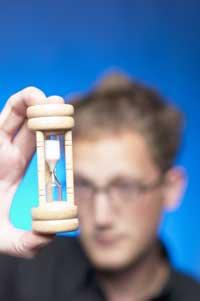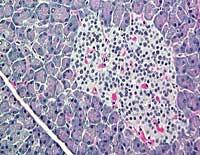Dream to lengthen life
2009/07/25 Galarraga Aiestaran, Ana - Elhuyar Zientzia
According to a study published in the journal Nature, it seems that sleep can become a reality. The study analyzes the influence of the drug Rapamycin on the life of mice. Rapamycin is used in medicine to avoid rejection of transplanted organs, but researchers suspected that it could influence throughout their lives and have now shown that, if taken with food, life increases between 9% and 13%. Mouse.

The study has been led by the US institute ITP, which leads the research of aging, and has been conducted in parallel in three centers. In total, 200 different mice have been genetically analyzed to ensure that the result is not related to the type of mouse.
Mice were given a daily dose of rapamycin along with food. In fact, it was intended to start with the experiment when mice were young, but there were problems in preparing food and, finally, when mice were 600 days they began to give rapamycin. That is, if they were people, at approximately 60 years old. The result, however, has been significant, with an increase of 13% in the life of females compared to mice that had not ingested drugs, compared to 9% of males.
Therefore, although it has not been intentional, they have seen that treatment is effective even in adulthood, and that is good. At least that has seemed to David Harrison, a researcher who has participated in the experiment: He is 67 years old and says he is still in time to start treatment joke.
Some Harrison comrades, for their part, express seriously the opposite and claim that they have no intention of raping or recommending to anyone. And it is that, although they have not detected serious side effects to mice, it is still very soon to think it will be useful for people. First they will have to solve some problems.
One of the biggest problems is that it weakens the immune system, increasing the risk of contracting diseases. Another problem is the dose, since transplanted people have given mice a daily dose much higher than they receive.
Thus, in the first place, they want to clarify the mechanism by which rapamycin works. Some scientists believe it may be related to diet reduction, since both act on the same cellular path, but have not yet confirmed it.
Eat little and long time
However, with the reduction of the diet they have no doubt, there is more and more evidence that the reduction of the diet prolongs life. The last one, published in the journal Science, is an experiment carried out at the University of Wisconsin. In fact, it has been compared for 20 years the life of monkeys who ate enough and those who had a reduced diet.
Reduced-diet monkeys progressively reduced their calories from 10% less than normal to 30% less. Twenty years later, they discover that 13% of those monkeys died. In the group of monkeys who ate everything they wanted, 37% died in that period. In addition, those who had a reduced diet had better health and had fewer diseases that increase with age, such as diabetes, cancer, cardiovascular problems and cerebral atrophy.
Human beings are also carrying out long-term experiments to see what benefits and what damage are caused by reduced diets. However, researchers have wanted to make it clear that volunteers involved in the experiments are under the control of physicians to avoid malnutrition problems. In case they will also say, even if someone wants to try on their own...
Published in Gara

Gai honi buruzko eduki gehiago
Elhuyarrek garatutako teknologia





